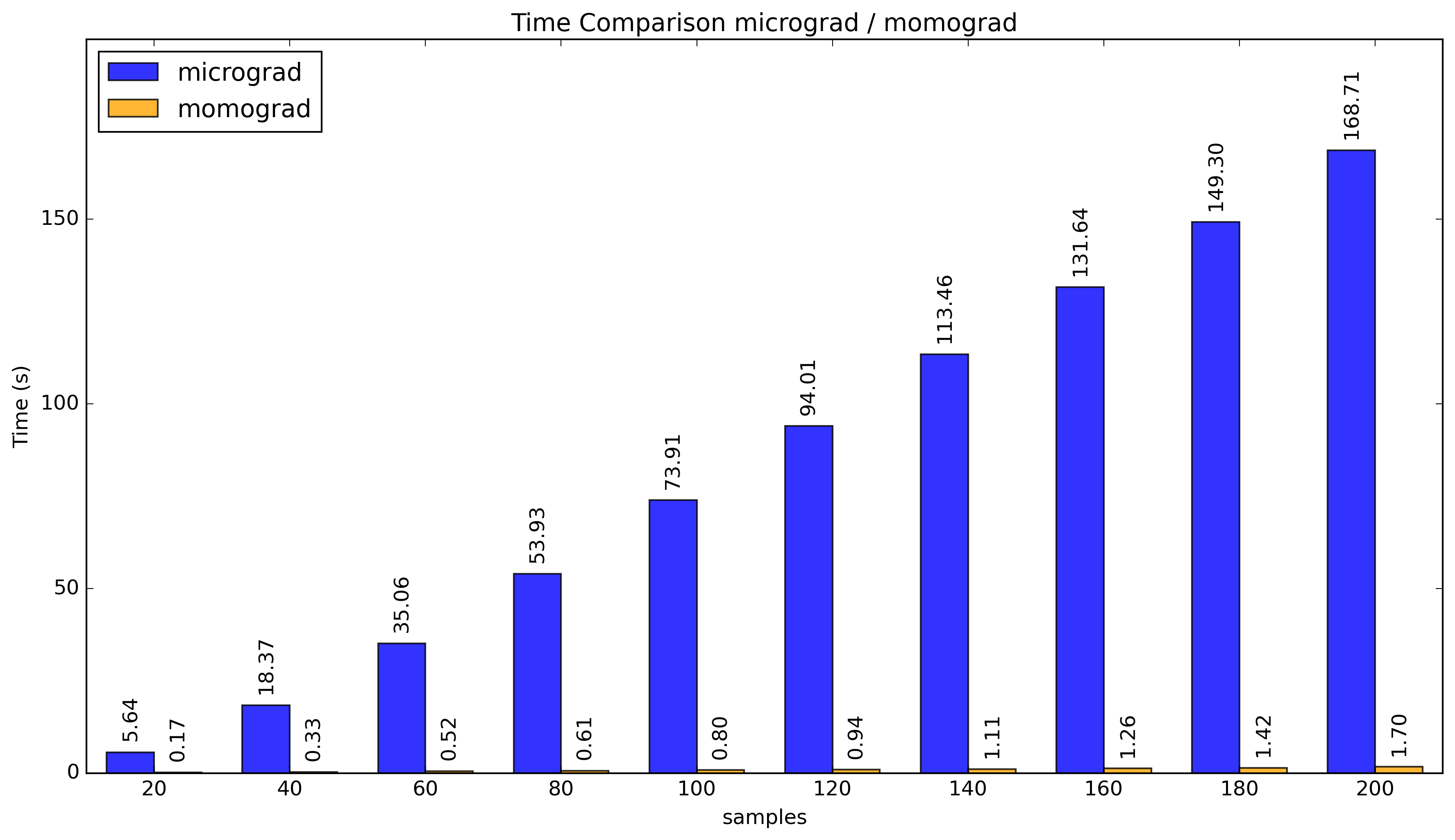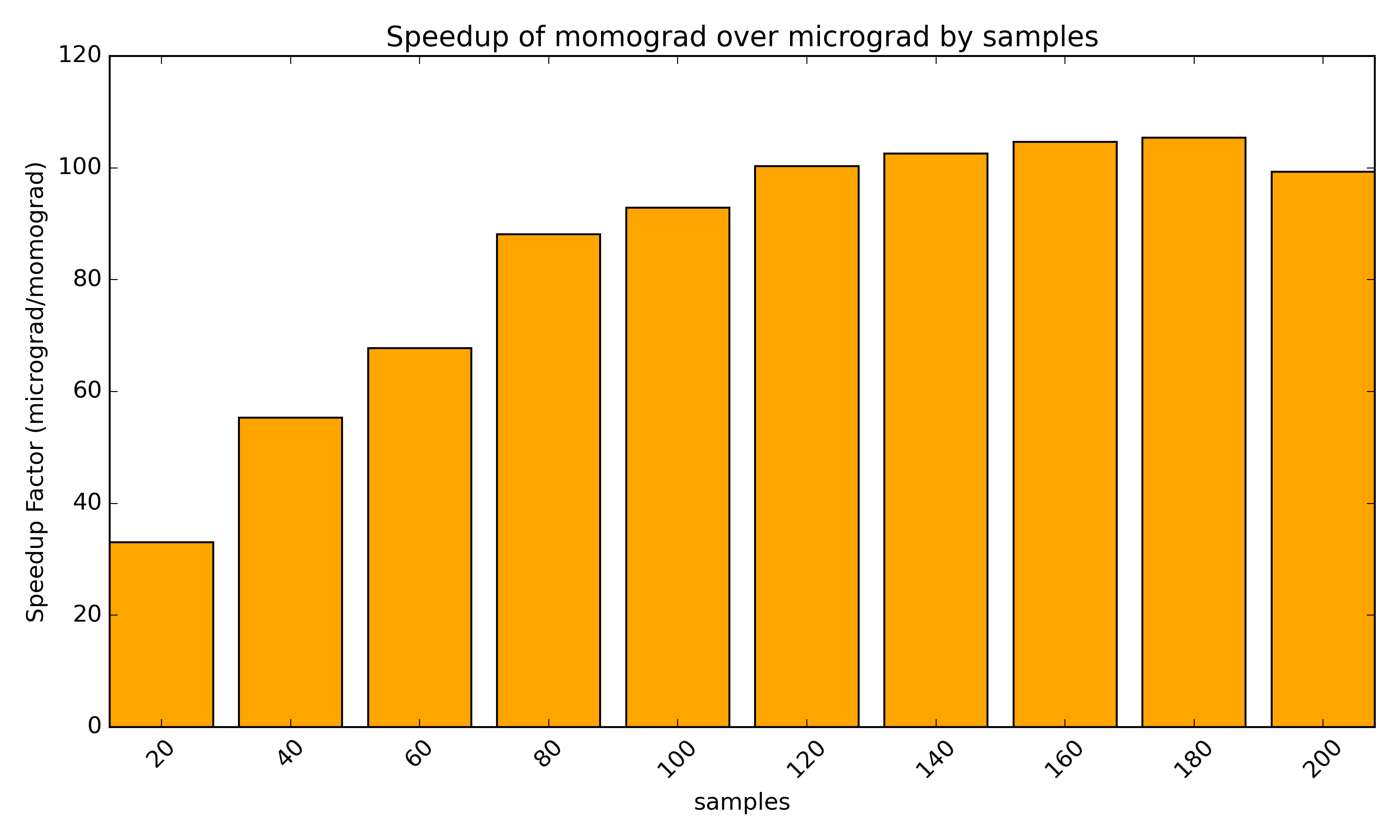This project represents an implementation of Andrej Karpathy's Python based micrograd library in the Mojo programming language.
micrograd is a tiny scalar-valued autograd engine and a neural net library on top of it with PyTorch-like API. For an in depth explanation of what it is about and it's implementation details, don't miss to watch Andrej's excellent YouTube video The spelled-out intro to neural networks and backpropagation: building micrograd.
momograd aims to follow micrograd's clean implementation structure with no intention to go beyond its functionality, but to learn how things can be done in Mojo. Expect to encounter bugs and sharp edges here.
momograd.x ventures further into exploring Mojo's unique capabilities, focusing on optimizations such as vectorization and parallelization. This extension serves as a playground for delving into more advanced Mojo-specific enhancements, pushing beyond the original implementation logic of micrograd to explore how performance and efficiency can be improved within the Mojo sphere.
The Value struct of momograd.engine represents the basic building block for the computational graph.
from momograd.engine import Value
fn main() raises:
var a = Value(3,"a")
var b = Value(2,"b")
var c = a + b
c.label = 'c' # optional label
var d = c ** a
d.label = 'd'
# calulating the gradients of the computational graph
d.backward()
print(d) # <data: 125.0, grad: 1.0>
print("\nComputational graph:")
d.print_branch() See demo_engine.mojo for a more elaborate example.
Following the implementation of micrograd, momograd.nn contains two structs for building neuronal networks, Neuron and Layer, and an implementation of a Multi-Layer Perceptron, MLP.
See demo_nn.mojo for a basic example how to use these structs in Mojo.
Playground for Mojo specific optimizations.
The micrograd github repository includes a full demo of training an 2-layer neural network (MLP) binary classifier
(demo.ipynb). In order to be able to run basic benchmark comparisons, we include the core of it in binary_classifier.py, and reimplemented it in Mojo using momograd: binary_classifier.mojo.
binary_classifier_x.mojo takes advantage of our experimental momograd.x package.
Please take the following benchmark results with a grain of salt. We basically ignored everything mentioned in the excellent blog post by Konstantinos Krommydas, How to Be Confident in Your Performance Benchmarking. Here we just measured the time the training loops took for 100 epochs and various sample size inputs for binary_classifier.py and binary_classifier.mojo, averaged over a couple of runs, and joyfully observed how fast Mojo actually is.
| samples | micrograd (sec) | momograd (sec) | momograd.x (sec) | speedup micro/momo | speedup micro/momo.x | speedup momo/momo.x |
|---|---|---|---|---|---|---|
| 20 | 5.64 | 0.15 | 0.13 | 36.6x | 44.9x | 1.2x |
| 40 | 18.37 | 0.31 | 0.23 | 59.1x | 79.8x | 1.3x |
| 60 | 35.06 | 0.48 | 0.35 | 72.7x | 100.1x | 1.4x |
| 80 | 53.93 | 0.63 | 0.48 | 86.1x | 112.6x | 1.3x |
| 100 | 73.91 | 0.82 | 0.61 | 90.5x | 122.0x | 1.3x |
| 120 | 94.01 | 0.97 | 0.71 | 96.8x | 132.3x | 1.4x |
| 140 | 113.46 | 1.16 | 0.84 | 97.7x | 134.4x | 1.4x |
| 160 | 131.64 | 1.28 | 0.91 | 102.5x | 144.6x | 1.4x |
| 180 | 149.30 | 1.46 | 1.01 | 102.6x | 148.5x | 1.4x |
| 200 | 168.71 | 1.70 | 1.28 | 99.1x | 131.7x | 1.3x |
For instructions on running benchmarks, see Benchmark Instructions.
-
2024.03.31
- Introduced momograd.x: A new package focusing on Mojo-specific performance enhancements.
momograd.xboostsmomogradperformance by 1.4x through MLP layer-level parallelization for forward pass.
-
2024.03.29
- Initial repository setup and commit.
MIT


